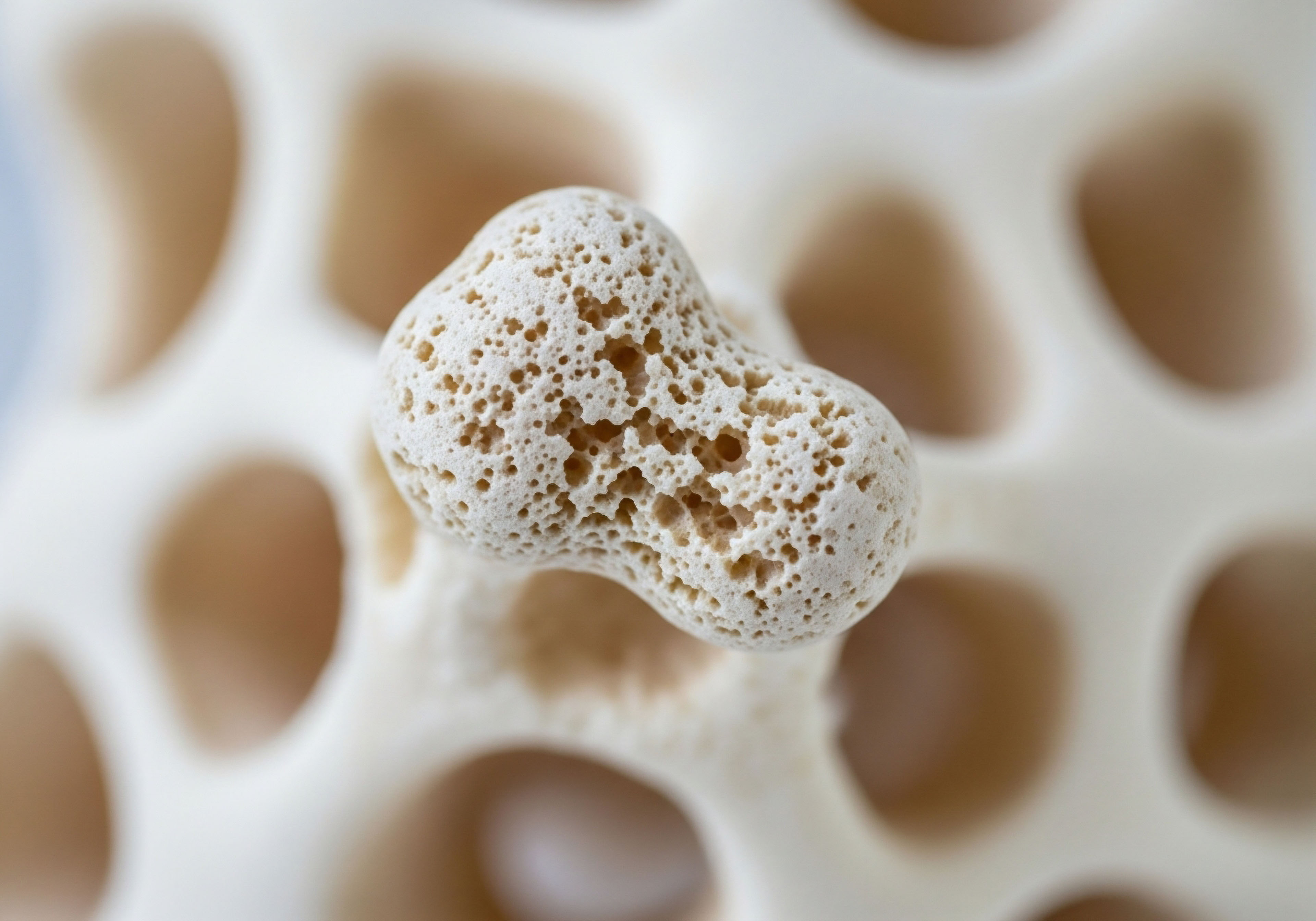

Fundamentals
You may have felt it as a subtle shift, a lack of sharpness where once there was clarity. It can manifest as a word that remains just out of reach, a forgotten appointment, or a general sense of mental fog that clouds your day. This experience of cognitive change is deeply personal and real.
It is the lived sensation of a finely tuned biological system beginning to lose its precision. Your brain, the most complex and energy-demanding organ in your body, does not operate in isolation. Its function is inextricably linked to the body’s master communication network ∞ the endocrine system.
This intricate web of glands and hormones acts as a constant, flowing river of information, directing growth, managing energy, and shaping our very thoughts and feelings. When the key messengers in this system begin to decline, the clarity of the signal fades, and the brain is one of the first places this is felt.
At the heart of this internal communication network are the steroid hormones, particularly estrogen, progesterone, and testosterone. These molecules are synthesized from cholesterol and are known for their roles in reproduction, yet their influence extends deep into the central nervous system. They are, in a very real sense, foundational to brain architecture and function.
They support the health and plasticity of neurons, the specialized cells that transmit nerve impulses. They modulate the activity of neurotransmitters, the chemical couriers that regulate mood, focus, and memory. And they ensure the integrity of the vascular network that supplies the brain with the oxygen and nutrients it needs to perform.
The decline of these hormones during perimenopause, menopause, and andropause is a profound biological shift, one that alters the very environment in which your brain cells live and work.
The sensation of cognitive fog is a tangible signal of underlying changes within the body’s endocrine communication system.

The Brain’s Dependence on Hormonal Signals
To understand the connection between hormones and cognition, it is helpful to view the brain as a dynamic, living ecosystem. Its health depends on a delicate balance of growth, protection, and energy utilization. Hormones are critical regulators of this balance. Estrogen, for instance, is a powerful agent of neuronal growth and survival.
It promotes synaptic plasticity, the ability of synapses to strengthen or weaken over time, which is the cellular basis of learning and memory. It also supports cerebral blood flow, ensuring that energy-hungry brain regions receive adequate circulation. When estrogen levels fall, these supportive mechanisms are diminished, potentially leaving the brain more vulnerable to age-related changes.
Testosterone, while often associated with male physiology, is also vital for both men and women. In the brain, it contributes to verbal memory, spatial abilities, and processing speed. Its decline can correlate with a reduction in these functions, as well as changes in mood and vitality that indirectly affect cognitive performance.
Progesterone, and its potent metabolite allopregnanolone, have a distinct calming and protective effect on the brain. They interact with GABA receptors, the primary inhibitory system of the brain, helping to quell the “noise” of excessive neuronal firing. This action is profoundly neuroprotective, shielding brain cells from the damaging effects of stress and inflammation.
The loss of progesterone can therefore lead to a state of increased neuronal excitability, which may manifest as anxiety, poor sleep, and a diminished capacity for focused thought.

What Is Hormonal Aging?
Hormonal aging is the natural, progressive decline in the production of key hormones. This process begins for many people in their late 30s or early 40s and accelerates during midlife. For women, this is experienced as perimenopause and menopause, marked by a dramatic drop in estrogen and progesterone.
For men, the process is more gradual, known as andropause, characterized by a slow but steady decline in testosterone. This is a systemic change. The reduction in these hormonal signals creates a ripple effect throughout the body, impacting metabolic health, bone density, cardiovascular function, and the nervous system.
The cognitive symptoms that arise during this time are a direct reflection of the brain adapting to a new, less supportive biochemical environment. Understanding this connection is the first step toward developing a strategy to maintain cognitive vitality throughout the lifespan.


Intermediate
The question of whether hormonal optimization can reverse cognitive decline requires a more detailed examination of the mechanisms at play. The answer is deeply dependent on the principles of timing, type, and therapeutic target. The body’s response to hormonal therapy is governed by the state of the underlying tissues.
The “critical window hypothesis” has become a central concept in understanding the effects of estrogen replacement in women. This theory posits that there is a specific period, typically around the onset of menopause, during which brain cells are most receptive to the neuroprotective benefits of estrogen.
Initiating therapy during this window may help preserve the neural architecture and function that estrogen once supported. Conversely, introducing estrogen to a brain that has been deprived of it for many years, and may have already undergone age-related changes or accumulated subclinical vascular damage, could provoke a different, and potentially adverse, response.
This highlights a crucial distinction ∞ hormonal therapy is a tool for restoring a specific biological environment, a process of recalibration. Its success depends on intervening before significant, irreversible changes have occurred. For women, this involves carefully considering the use of bioidentical estrogen and progesterone.
Bioidentical hormones are molecularly identical to those produced by the human body. This is particularly important when it comes to progesterone, as synthetic progestins (progestogens) do not share the same neuroprotective profile. Natural progesterone is metabolized into allopregnanolone, a powerful neurosteroid that promotes calm, improves sleep, and protects brain cells. Synthetic progestins do not provide this benefit and, in some cases, may counteract the positive effects of estrogen on the brain.

Protocols for Endocrine System Support
Personalized wellness protocols are designed to address diagnosed hormonal deficiencies with precision. The goal is to restore hormonal parameters to a range associated with optimal function, thereby supporting the systems that depend on them, including the brain. These protocols are always based on comprehensive lab testing and a thorough evaluation of an individual’s symptoms and health history.

Hormonal Optimization for Women
For women experiencing perimenopausal or postmenopausal cognitive symptoms, therapy often involves a combination of hormones to recreate a state of physiological balance. The specific components are chosen to address the multifaceted nature of hormonal decline.
- Testosterone Cypionate ∞ While often considered a male hormone, testosterone is crucial for female cognitive function, libido, and vitality. Women are typically prescribed low doses, such as 10 ∞ 20 units (0.1 ∞ 0.2ml) administered weekly via subcutaneous injection. This approach can help restore mental clarity and energy levels.
- Progesterone ∞ The use of progesterone is tailored to a woman’s menopausal status. For those still cycling, it is used cyclically to mimic a natural rhythm. For postmenopausal women, it is often prescribed for daily use. Oral micronized progesterone is favored for its ability to be metabolized into allopregnanolone, which supports sleep and provides neuroprotective benefits.
- Estrogen ∞ Transdermal estrogen (patches or gels) is often preferred as it bypasses the liver, leading to a more favorable safety profile. The dose is adjusted to alleviate symptoms like hot flashes and to provide systemic benefits, including support for cognitive function, when initiated within the critical window.

Hormonal Optimization for Men
For men diagnosed with hypogonadism (low testosterone), the primary goal is to restore testosterone levels to a healthy, youthful range. However, a sophisticated protocol also manages the downstream effects of this restoration to ensure both efficacy and safety.
The efficacy of hormonal therapy for cognitive health is critically dependent on the timing of initiation and the specific type of hormones used.
| Medication | Purpose | Typical Protocol |
|---|---|---|
| Testosterone Cypionate | The primary androgen for restoring testosterone levels. It addresses symptoms of low T, including low energy, mood changes, and cognitive difficulties. | Weekly intramuscular injections (e.g. 200mg/ml). |
| Gonadorelin | Maintains the function of the Hypothalamic-Pituitary-Gonadal (HPG) axis. It stimulates the testes to continue their own production of testosterone and preserve fertility. | Twice-weekly subcutaneous injections. |
| Anastrozole | An aromatase inhibitor that blocks the conversion of testosterone to estrogen. This helps prevent side effects associated with elevated estrogen levels in men. | Twice-weekly oral tablet, with dosage adjusted based on lab results. |
| Enclomiphene | May be used to stimulate the pituitary gland to produce Luteinizing Hormone (LH) and Follicle-Stimulating Hormone (FSH), further supporting natural testicular function. | Prescribed orally, often as part of a comprehensive or post-cycle protocol. |
While meta-analyses on testosterone therapy and cognition have yielded mixed results, with some showing no significant overall improvement, others have noted benefits in specific domains like verbal memory, particularly in men who had low levels to begin with.
The subjective improvements in mood, vitality, and well-being reported by many men on TRT can also create an indirect positive effect on cognitive performance. A man who feels more energetic and motivated is more likely to engage in cognitively stimulating activities.

How Do Peptide Therapies Support Cognitive Function?
Peptide therapies represent another frontier in personalized wellness, targeting specific biological pathways to optimize function. Growth hormone secretagogues, such as Sermorelin and the combination of Ipamorelin/CJC-1295, work by stimulating the body’s own production of growth hormone. Growth hormone plays a role in cellular repair and metabolism.
One of its most significant benefits for cognitive health is its profound effect on sleep quality. Deep, restorative sleep is essential for memory consolidation and the brain’s nightly “cleanup” processes, which clear out metabolic waste. By improving sleep architecture, these peptides can have a powerful, indirect effect on next-day cognitive function, clarity, and focus.


Academic
A sophisticated analysis of the relationship between hormonal therapy and cognitive longevity requires a systems-biology perspective, moving beyond a single-hormone, single-outcome model. The central nervous system is a steroid-sensitive and steroid-synthesizing organ.
The question is not simply whether a hormone is “good” or “bad” for the brain, but how that hormone interacts with the existing cellular environment, an environment that is profoundly altered by age and the duration of hormonal deprivation. The “timing hypothesis” or “critical window” theory, supported by a growing body of observational data and mechanistic studies, provides the most coherent framework for understanding the divergent outcomes seen in clinical trials of hormone therapy in women.
The Women’s Health Initiative Memory Study (WHIMS), a large randomized controlled trial, reported an increased risk of dementia in women aged 65 and older who initiated combined estrogen-progestin therapy. This finding, which has shaped clinical practice for decades, stands in contrast to numerous observational studies suggesting a reduced risk of Alzheimer’s disease in women who began hormone therapy around the time of menopause.
The resolution of this paradox likely lies in the concept of neuronal health. In a relatively healthy, younger brain at the onset of menopause, estrogen acts as a neuroprotective agent. It upregulates neurotrophic factors, supports mitochondrial function, enhances synaptic plasticity, and maintains the integrity of the cerebral vasculature. In this state, estrogen supplementation may preserve a healthy cognitive trajectory.
The interaction between hormone therapy and the brain is governed by the pre-existing health of the neural and vascular environment.
In an older brain, however, one that has been without estrogen for a decade or more, the cellular landscape is different. There may be underlying inflammation, mitochondrial dysfunction, or atherosclerosis in the cerebral microvasculature. Introducing estrogen into this environment may not be protective.
Instead, it could potentially trigger inflammatory pathways or interact with existing vascular pathology in a detrimental way. Therefore, the effect of the hormone is conditional, dependent on the health of the target tissue. This is supported by studies showing that women who start HT within five years of menopause show a decreased risk of Alzheimer’s disease, an effect that is not seen in those who start later.

Molecular Mechanisms and Hormone Specificity
The specific molecular structure of the hormones used is of paramount importance. The term “hormone replacement therapy” is imprecise because it groups together vastly different molecules. The neuroprotective effects of progesterone are a clear example. Endogenous progesterone is metabolized in the brain to 5α-dihydroprogesterone and then to allopregnanolone.
Allopregnanolone is a potent positive allosteric modulator of the GABA-A receptor, the main inhibitory neurotransmitter receptor in the brain. By enhancing GABAergic tone, allopregnanolone reduces neuronal excitability, exerts anxiolytic effects, and promotes restorative sleep. It also has direct anti-inflammatory and myelin-regenerating properties.
Synthetic progestins, such as medroxyprogesterone acetate (MPA) used in the WHIMS trial, do not share this metabolic pathway. They do not convert to allopregnanolone. Some research suggests that MPA may even interfere with the neuroprotective actions of estrogen, potentially contributing to the negative outcomes observed in that trial.
This underscores the principle of biochemical specificity ∞ the biological activity of a hormone is a direct result of its molecular shape and how it interacts with cellular receptors and metabolic enzymes. When seeking to restore a physiological state, the use of bioidentical molecules is the most logical approach.

Testosterone and Cognition a Complex Picture
The role of testosterone in male cognitive function presents a more ambiguous picture. While low testosterone is associated with cognitive complaints, and men with hypogonadism can show impairments in verbal memory and executive function, large-scale intervention trials have not consistently demonstrated a robust cognitive benefit from testosterone replacement therapy (TRT). A systematic review and meta-analysis of randomized controlled trials found no statistically significant improvement in overall cognitive functioning, though some small effects were noted in specific study subsets.
This lack of a clear, direct effect suggests the relationship is complex and likely indirect. Testosterone’s influence on cognition may be mediated through its effects on other systems. For example, TRT is known to improve mood, reduce symptoms of depression, and increase vitality and motivation.
Depression itself is a significant risk factor for cognitive decline. By alleviating depressive symptoms, TRT may indirectly improve cognitive performance. Furthermore, testosterone supports cardiovascular health and blood flow, which is essential for brain function. It also has a positive impact on muscle mass and metabolic health, which are linked to cognitive longevity.
The cognitive benefits of TRT may be a secondary consequence of a more global improvement in physical and mental health, rather than a direct modulation of neuronal function in the way that estrogen and progesterone operate.
| Hormone | Primary Neurological Mechanism | Associated Cognitive Domain | Considerations for Therapy |
|---|---|---|---|
| Estrogen | Promotes synaptic plasticity, supports mitochondrial function, enhances cerebral blood flow, and upregulates neurotrophic factors. | Learning, Memory, Overall Cognitive Function. | Efficacy is highly dependent on the “critical window”; initiation near menopause is key. Transdermal administration is often preferred. |
| Progesterone (Bioidentical) | Metabolizes to allopregnanolone, which modulates GABA-A receptors, reducing excitability and promoting calm and sleep. It is also anti-inflammatory. | Sleep Quality, Anxiety Reduction, Neuroprotection. | Synthetic progestins do not provide the same neuroprotective benefits and may be counterproductive. |
| Testosterone | Modulates dopamine and other neurotransmitter systems, supports cerebral blood flow, and improves mood and vitality. | Verbal Memory, Spatial Function, Processing Speed (effects are often subtle). | Benefits may be indirect, stemming from improvements in mood, energy, and metabolic health. Protocols must manage estrogen conversion. |

What Is the Relevance of the APOE4 Genotype?
The apolipoprotein E (APOE) gene provides a compelling example of how genetic factors can interact with hormonal status to influence cognitive risk. The APOE4 allele is the strongest known genetic risk factor for late-onset Alzheimer’s disease. Some research suggests that the cognitive effects of hormone therapy may differ in women who carry the APOE4 allele.
The mechanisms are still being investigated, but it appears that APOE4 may alter how the brain processes lipids and responds to injury, and estrogen’s influence on these pathways could be modified by the presence of the APOE4 protein. This is an area of active research and highlights the future of personalized medicine, where therapeutic decisions will be informed not just by hormone levels and symptoms, but also by an individual’s unique genetic predispositions.

References
- Brinton, Roberta Diaz. “Progesterone in the Brain ∞ Hormone, Neurosteroid and Neuroprotectant.” Italian Journal of Anatomy and Embryology, vol. 124, no. 1, 2019, pp. 1-15.
- Resnick, Susan M. and Peter P. Zandi. “Alzheimer’s disease ∞ review of hormone therapy trials and implications for treatment and prevention after menopause.” The Journal of steroid biochemistry and molecular biology, vol. 83, no. 1-5, 2002, pp. 167-75.
- Shumaker, Sally A. et al. “Estrogen plus progestin and the incidence of dementia and mild cognitive impairment in postmenopausal women ∞ the Women’s Health Initiative Memory Study ∞ a randomized controlled trial.” JAMA, vol. 289, no. 20, 2003, pp. 2651-62.
- Zandi, Peter P. et al. “Hormone replacement therapy and incidence of Alzheimer disease in older women ∞ the Cache County Study.” JAMA, vol. 288, no. 17, 2002, pp. 2123-29.
- Martin, B. et al. “Testosterone Supplementation and Cognitive Functioning in Men ∞ A Systematic Review and Meta-Analysis.” The Journal of Clinical Endocrinology & Metabolism, vol. 101, no. 10, 2016, pp. 3847-61.
- Saletan, J. “Timing of Hormone Therapy May Affect Alzheimer’s Prevention.” Neurology Today, vol. 12, no. 20, 2012, pp. 1, 24-25.
- Stein, Donald G. “PROGESTERONE EXERTS NEUROPROTECTIVE EFFECTS AFTER BRAIN INJURY.” Brain Research Reviews, vol. 48, no. 2, 2005, pp. 386-97.
- Gleason, Carey E. et al. “Effects of hormone therapy on cognition and mood in newly postmenopausal women ∞ a randomized clinical trial.” PLoS medicine, vol. 12, no. 6, 2015, e1001833.
- Coker, Laura H. et al. “Postmenopausal hormone therapy and cognitive outcomes ∞ the Women’s Health Initiative Memory Study (WHIMS).” The journals of gerontology. Series A, Biological sciences and medical sciences, vol. 65, no. 9, 2010, pp. 956-64.
- Cherrier, M. M. et al. “Testosterone treatment of men with mild cognitive impairment and low testosterone.” American Journal of Alzheimer’s Disease & Other Dementias®, vol. 20, no. 6, 2005, pp. 357-61.

Reflection
The information presented here provides a map of the intricate biological landscape that connects your endocrine system to your cognitive health. This map is drawn from decades of scientific inquiry, clinical experience, and the lived realities of countless individuals who have navigated these changes.
It details the pathways, highlights the critical junctures, and identifies the tools available for intervention. This knowledge is powerful. It transforms the conversation from one of passive endurance to one of active, informed stewardship of your own biology.
Understanding the mechanisms of hormonal influence, the importance of timing, and the specificity of different therapeutic agents gives you a new lens through which to view your health. It allows you to ask more precise questions and to seek out guidance that is aligned with a systems-based, personalized approach.
This journey is one of partnership, a collaborative effort between you and a clinician who understands this terrain. The ultimate goal is the restoration of function and the preservation of vitality, allowing you to operate with clarity and purpose for the full duration of your life. The path forward begins with this understanding, translating knowledge into deliberate action.



